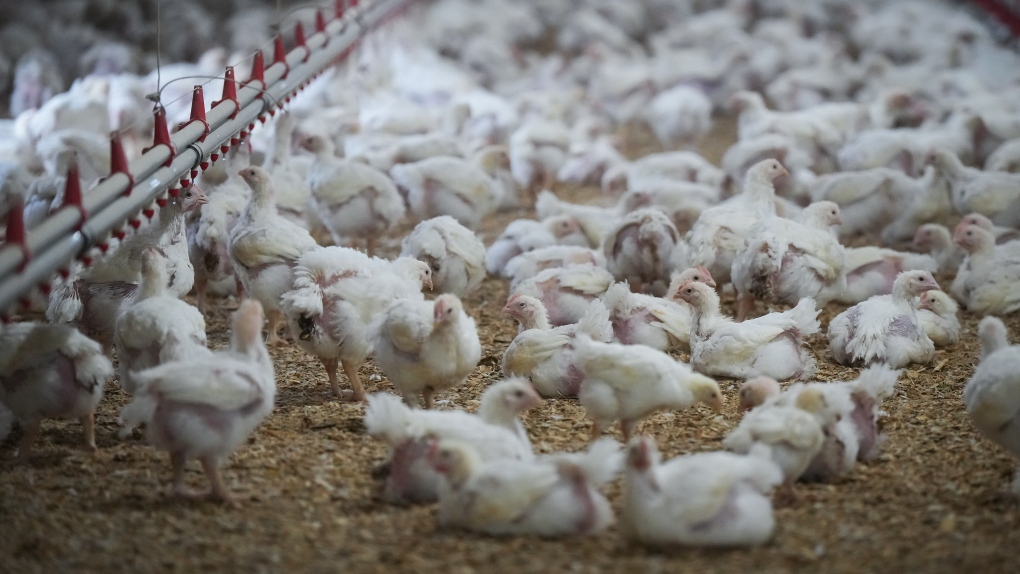B.C. teen with Canada's first human case of avian flu no longer in ICU
 Chickens are seen at a poultry farm in Abbotsford, B.C., on Thursday, November 10, 2022. (Darryl Dyck / The Canadian Press)
Chickens are seen at a poultry farm in Abbotsford, B.C., on Thursday, November 10, 2022. (Darryl Dyck / The Canadian Press)
The B.C. teenager who became infected with Canada's first human case of H5N1 avian influenza was transferred out of intensive care and taken off supplemental oxygen last month.
While health officials have not provided any updates on the case since November, new details were published Tuesday in the New England Journal of Medicine, in a report signed by doctors from the Public Health Agency of Canada, the B.C. Centre for Disease Control, and B.C. Children's Hospital.
The patient – described as a 13-year-old girl with mild asthma – was initially taken to an undisclosed emergency department on Nov. 4 with a fever and conjunctivitis.
She was sent home without treatment, only to be brought back to hospital three days later in "respiratory distress," according to the case report. The teenager was then transferred to the ICU at B.C. Children's, suffering from pneumonia, acute kidney injury, thrombocytopenia, leukopenia and respiratory failure.
She remained in intensive care until Dec. 4, when she was transferred to the hospital's pediatric ward. By Dec. 18, she no longer required supplemental oxygen.
Provincial officials announced the child's infection on Nov. 9 – after the presence of the H5 influenza virus was confirmed through testing – and launched an investigation into how and where she acquired the disease.
The government did not share any personal details on the patient at that time, except that she is from B.C.'s Fraser Valley. The report published in the New England Journal of Medicine this week indicates both the patient and her family consented to releasing additional details on her case.
The Ministry of Health told CTV News it could not provide any further information on Wednesday, including whether the child remains in hospital.
Provincial health officer Dr. Bonnie Henry announced the findings of the government's investigation on Nov. 29, confirming they had found "no evidence of transmission" from the child, and "no evidence of other cases" in B.C. either.
The source of the teenager's infection was never established, however, despite the testing of dozens of animal and environmental samples, all of which came back negative. Henry said the investigation was closed, at least temporarily, for lack of additional leads.
Genome sequencing did indicate the virus was the same one "circulating among poultry and wild birds" in both B.C. and Washington state since October, and "recently detected in a severe human infection in Louisiana," according to an appendix posted with the case report on Tuesday.
The doctors also noted there was evidence of a "worrisome" genetic mutation that "may increase binding to human airway receptors."
There have been 66 human cases of H5N1 confirmed across the U.S. so far, including 11 in Washington state, according to the U.S. Centers for Disease Control, which considers the overall public health risk to be "low." There have been outbreaks of the virus among poultry in all 50 states.
B.C.'s Ministry of Health advises anyone who has been exposed to sick or dead animals, or who works on a farm where avian influenza has been detected, to watch for flu-like symptoms. If those symptoms develop within 10 days of exposure, officials recommend telling a health-care provider.
With files from CTV News Vancouver’s Kaija Jussinoja and Michele Brunoro
CTVNews.ca Top Stories

LIVE UPDATES Uncontained L.A. wildfires are still burning. Here's the latest as firefighters battle the flames
A series of wildfires are tearing through densely populated parts of the Los Angeles, Calif. area. Five people have been reported dead. About 130,000 have been asked to evacuate. Nearly 2,000 homes and other buildings have been destroyed after the fires charred about 108 square kilometres.
'True when I said it, true today': former Canadian PM Harper pushes back against Trump on social media
Former prime minister Stephen Harper doesn’t find U.S. president-elect Donald Trump’s jibes about Canada becoming the 51st U.S. state very amusing.
NEW Tipping guide to Canada: When, where and how much to tip for restaurants, taxis and more
CTVNews.ca has created an entirely unofficial guide to tipping in Canada to help visitors, newcomers and curious Canadians navigate the shifting social norms of when, where and how much to tip.
Cape Breton police ask for public's help in finding Justin MacDonald's remains
Police in Cape Breton are asking for the public’s help in finding the remains of a missing man they believe was murdered.
Billy Crystal, Paris Hilton among celebrities whose homes were destroyed in L.A. wildfires
Paris Hilton, Adam Brody and Billy Crystal were among the celebrities who lost their homes in the devastating wildfires that swept through Los Angeles.
Can the U.S. really make Canada the 51st state?
Talk of Canada becoming the 51st American state has raised an existential question on this side of the border: Could it be done? Could the maple leaf make way to the stars and stripes? According to several experts, it may be possible, but not painless.
Suspicious deaths in Mahone Bay result of intimate partner violence: N.S. RCMP
The RCMP in Nova Scotia says two suspicious deaths in Mahone Bay, N.S., over the weekend were the result of intimate partner violence.
Sask. ministry says it mailed more than 400 T4A tax slips to the wrong address
Saskatchewan's Ministry of Advanced Education says 415 T4A tax slips were mistakenly sent to wrong addresses after errors with an electronic spreadsheet.
'This isn't just my mom's story,' says daughter of woman allegedly killed by partner
Abigail Robson says she moved from Nova Scotia to Alberta as a young girl with her mother 10 years ago for a fresh start.
































